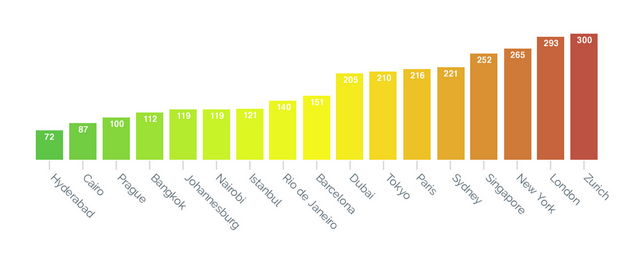
While a salary increase might improve your standard of living, the reality is more complicated.
Forget the concrete jungle with its big city lights and dream chasers, landing a new job in a different part of the country requires a lot of strategic decision-making.
While a 6 figure salary might lead to a greater standard of living, have you thought about how much you’ll have fork out to cover your living expenses?
Not really? Thank Expatistan for doing it on your behalf.
South Africa’s major cities are costly
The collaborative expat data website recently released the latest cost of living index, revealing cities with the highest cost of living around the world.
The company’s data was compiled from a combination of numerous international reports regarding cost of living and user input prices in a particular region. Areas where data was not available, was incomplete, outdated, or had too few inputs, were not included in the listing.
To calculate the global index, a value of 100 was assigned to Prague (Czech Republic) which was then used as the central reference city.
The Price Index value of each of the other countries was then calculated by comparing their cost of living to the cost of living in Prague.
Internationally, Zurich, London and New York are the most expensive cities to live.
Unsurprisingly, South Africa’s major cities; Johannesburg, Cape Town, Pretoria and Durban have the highest cost of living. Each of the cities scored 128, 114, 104 and 95 points respectively. In addition, Johannesburg is the most expensive city in Africa, followed by Nairobi.
How much can you afford to pay?
While many people flock to these major cities for greater employment opportunities, many have made the financial mistake of assuming that a larger income will directly lead to a better life. Although this may be true, it’s important that you consider the comparable disposable income you’ll have after factoring in expenses such as groceries, accommodation and transportation.
For instance, if living in Johannesburg, a person earning R20 000 can expect a disposable income of R6 788 if paying the average cost of R12 226 for an 85m2 apartment and R986 for transport.
For the same salary, a person living in Cape Town can expect a disposable income of R4 441 if paying R15 164 for the same apartment in Cape Town and R395 for transport.
In Pretoria, the average cost for the 85m2 apartment is R9 067 and transport R559. Therefore, a person living in the capital city can expect a disposable income of R10 374.
What’s more important to you?
Even if you decide to take the plunge, you need to consider what hopping cities will mean for you and those closest to you. Keep in mind that the support of family and friends is important and it’s not something you can put a price tag on.
Whether you’re a drifter or someone who prefers the comfort of family and friends, Careers24 has the latest job opportunities to suit your needs.